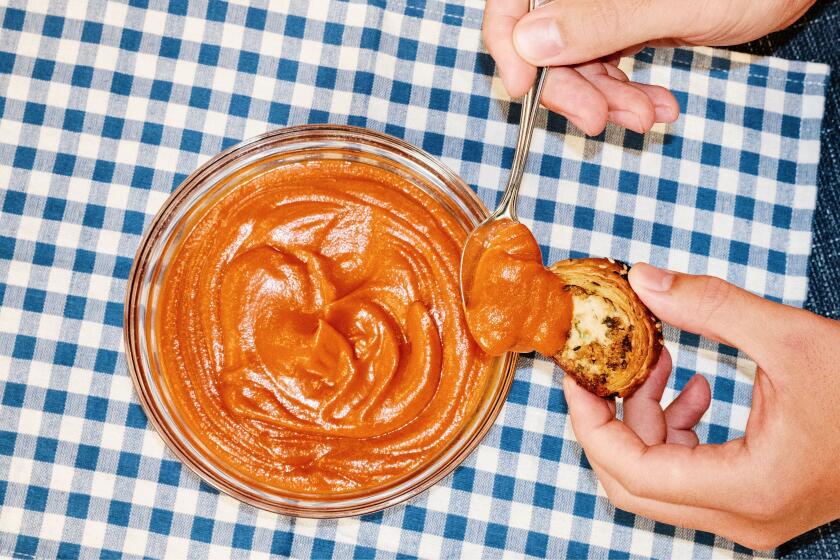Cornflakes Taste Like Poverty : The lessons and memories of childhood can haunt the psyches and cupboards of middle age.
Cornflakes so remind me of the powerlessness of poverty, the worst of my memories of being one of five children of poor parents, that I cannot eat them. Neither commercial nor generic cornflakes exist in my universe, because they take me back too far.
My father was a laborer with an elementary-school education and tremendous pride. Too frequently, he was temporarily laid off, for periods sometimes as long as a year. During periods of layoff, he devised alternate ways to produce income to support his family: He scavenged for old radios to repair and sell, he worked in carwashes during Philadelphia winters when no one else wanted to. He took any odd jobs that came up. When the jobs got too odd and too far between, he resorted to bartering. A neighborhood grocer, Mr. Birrell, would take an old electric mantel clock as collateral for food, on my father’s promise to pay with cash when his situation improved.
Mr. Birrell got to dictate the kind and quality of the goods he would exchange for the mantel clock. In a way that would never happen when my father was using cash for his purchases, Mr. Birrell would direct my father to get the largest box of cornflakes, a package of bologna or hot dogs, a loaf of bread, a large can of baked beans. If these provisions ran out before my father could scare up more cash, he would send one of us kids to Birrell’s with a note, and Mr. Birrell would package up more of the same. He did not look pleased to see us and our brown paper missives.
I was about 8 when I made a serious connection between cornflakes for three meals a day and my father’s bleaker moods, to which my mother paid careful attention. We kids had to not be aggravating, and my bag lunch would have dreaded boiled-egg sandwiches and little else. Then there was the time that Mr. Birrell hesitated to take the clock, even for cornflakes. Mrs. Birrell, who worked alongside her husband, slicing hams and salamis at the front of their narrow crowded store, had seen my mother emerge from the newly opened rival market across the street (closer to our house by several crucial steps after a long summer day folding hot sheets in a commercial laundry) with a grocery bag. Why wasn’t Birrell’s good enough for our cash, Mr. Birrell wanted to know. I don’t remember what my dad said to ensure that his children ate, but he got the cornflakes. I used to wish that he argued about his right to shop wherever he chose or that he wrapped that clock back up in its old towel and left. Of course, had he done that, there would not even have been cornflakes.
I have wrestled with the demon fear of poverty that alternately haunted me and fueled my efforts to build a life that might foreclose any resort to cornflakes. It took major inner resources and secrecy to live with a temporary need for food-stamps and Medi-Cal in my 20s. That was not something I could tell the proud man who reared me with constant reminders not to be “beholden to others.” I lost weight and sleep trying to resolve the conflict between relief and trepidation that accompanied my petition to the Oakland school district for my daughter to get reduced-cost school lunches during the lean years when I was earning my undergraduate degree. I hobbled through parts of my education pridefully rejecting financial aid, mouthing the justification that somebody needed it more than me.
Finally, in my fifth decade, with the daughter building her own future, I can live with a temporarily empty refrigerator without apprehension. When my checking account has $3.45 in it, I don’t think, nor do I wonder who else thinks that it is evidence of the capriciousness of my character that I could spend close the bone. I am pleased that my daughter had no idea we were so poor when she was growing up that some evenings she had dinner when I did not. She thinks our lives were interesting. We got by. We thrived.
But the line is drawn at cornflakes. They taste like poverty. The mental and spiritual weight of a soggy bowl of cornflakes is just too much. I have hedged on the frequent question, “How did you . . . “ because “By not eating cornflakes” seems such a frivolous answer. But there are moments when it feels like too long a look back might derail forward progress. I make some talismanic connection between not eating cornflakes and whatever success I can claim in this life. As long as there are no cornflakes in the cupboard, the risk of poverty is averted, and I have control of my destiny. I believe in this particular magic.
More to Read
Eat your way across L.A.
Get our weekly Tasting Notes newsletter for reviews, news and more.
You may occasionally receive promotional content from the Los Angeles Times.









